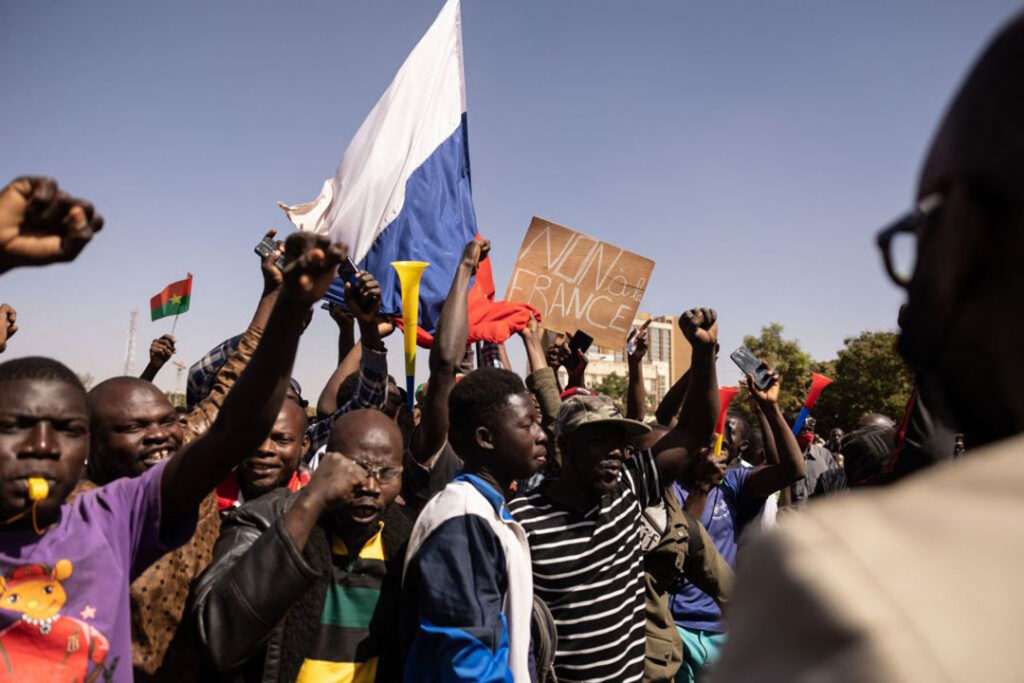ADF STAFF
As a crowd of more than 1,000 people gathered in Ouagadougou’s national square after the announcement of a military coup, there was an unusual sight: Russian flags being waved in celebration.
West Africa’s third coup in eight months has raised alarm among experts who see a pattern: Wherever there is instability, Russia appears ready to exploit it.
“It’s just a matter of time,” Nigerian journalist Philip Obaji Jr. told ADF. “From what I’ve been told by sources in the Burkinabe military, there is no Russian presence yet in the country, but that could change pretty soon.”
Sahelian terrorists affiliated with al-Qaida and the Islamic State group moved into Burkina Faso in 2015 and have killed thousands of Burkinabe. The violence has displaced more than 1.4 million people.
President Roch Marc Christian Kaboré, the country’s first democratically elected leader, was under growing pressure as attacks increased over several months before his ouster.
In December 2021, he promoted Lt. Col. Paul-Henri Sandaogo Damiba, 41, to shore up support in the military and take over security in Ouagadougou.
Instead, Damiba led the junta that took over the country.
Obaji broke the news that Kaboré was removed January 24, 2022, after twice refusing Damiba’s appeals that month to fight the terrorists by hiring the Wagner Group, an infamous Russian private military company.
Although Russia denies formal ties to the Wagner Group, its mercenaries have been involved with Mali’s junta and in the Central African Republic (CAR), where they have been accused of atrocities against the population and extraction of mineral resources.
Rumors and signs of Russia’s interest in Burkina Faso have grown rampant in recent months. The country, which bought Russian helicopters and weapons in the past, has seen a barrage of pro-Russian propaganda on social media.
In November 2021, protesters in three towns blocked a French Army convoy on its way to Niger. Some Burkinabe waved Russian flags and chanted “down with France.”
“The Russians are maneuvering,” France 24 senior reporter Cyril Payen said during a broadcast. “They are trying to fill the gap of the French. There is a huge information war using the social networks. People are quite vulnerable to that. It’s a very volatile situation now.”
When the Burkinabe coup was announced in a live broadcast, its leaders cited the previous government’s failure to suppress the insurgency as justification for taking power.
After the coup, the Economic Community of West African States (ECOWAS) and the African Union suspended Burkina Faso’s membership, but neither body has announced sanctions in hopes of negotiating a clear timetable to return the country to civilian rule.
Nigerien Foreign Minister Hassoumi Massoudou decried the irony of a junta turning to the Wagner Group for help.
“We do not understand that military leaders — after having failed in the field of war — take political power and call on mercenaries to defend the integrity of their territory,” he said during a virtual ECOWAS meeting on January 28.
Experts have warned that imposing sanctions on a country that historically has struggled economically and militarily could push Burkina Faso closer to Russia.
The day after the coup, two prominent Russians applauded the junta.
Yevgeny Prigozhin, whom experts believe runs the Wagner Group and who is a close associate of Russian President Vladimir Putin, hailed the coup as “a new era of decolonization” in a post on Russian social network VK by his company, Concord.
Alexander Ivanov, the official representative of Russian military trainers in CAR, issued a statement offering to train the Burkinabe military.
“I believe that if Russian instructors are invited to train the army of Burkina Faso, they can do it effectively,” he wrote.
Burkina Faso has not responded officially, sources told Obaji. But they expect that Damiba, who held an inauguration ceremony on February 16 in an effort to legitimize his role as Burkina Faso’s president, will accept Ivanov’s offer.
“The Russians are waiting to find out what role they’ll play once the new government fully settles down,” Obaji said. “Right now, the junta wants to focus on political and diplomatic issues, including having reasonable deliberations with ECOWAS.
“Burkina Faso needs help from abroad to be able to tackle the growing violence. But sanctions will deprive it of the military assistance it gets from the West and leave Burkina Faso at the mercy of Russia, which is waiting to step in.”

